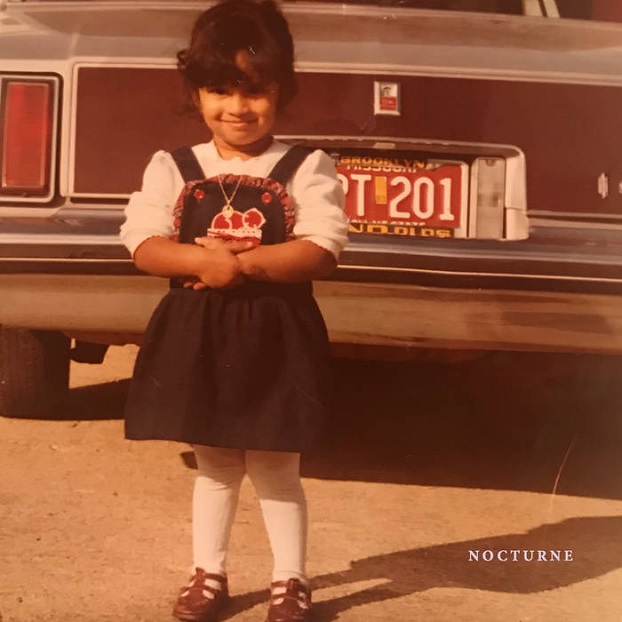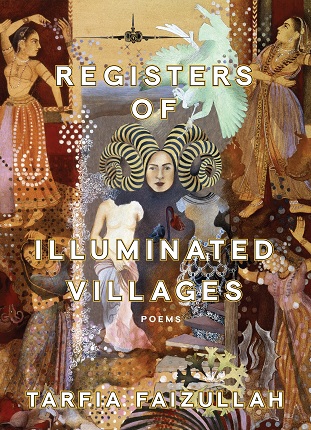
What happens when two talented Desis from two different cities come together on the west coast to kick it? The poetry and beats project Eat More Mango represents an artistic collaboration between NYC-based music producer Brooklyn Shanti and Detroit-based poet Tarfia Faizullah.
Together they released debut digital EP Nocturne last month via independent hip-hop platform Someplace Called Brooklyn. Nocturne is now streaming on Bandcamp and Soundcloud, and its four tracks are based on pieces from Tarfia’s latest book of poetry. The fourth track, “Mango,” is based on an amazing poem called “Self-Portrait as Mango” which is about that familiar “Your English is great!” microaggression.
The Aerogram caught up with Tarfia and Nabin (aka Brooklyn Shanti) to talk about Eat More Mango and Nocturne, and what’s ahead for the duo.

AM: How did the two of you meet and decide to embark on this collaboration?
Nabin: Neelanjana Banerjee at Kaya Press put us together to collaborate on work for an event she curated called Mehfil Massive at USC. We were set free to openly collaborate, so we hung out for a few days together and then also with Tablapusher (Robin Sukhadia) and assembled the audio and also the visuals for these four pieces.
Tarfia: Neela made us do it! Because she is a boss visionary and knows all the things. And I am indebted to her for life, both for organizing Mehfil Massive, as well as introducing me to Nabin. I’m also pretty grateful to her and Tablapusher for the tacos, and all the laughter. For me personally, the decision to collaborate came from wanting to challenge myself to collaborate with someone who worked in a totally different artistic genre, in a mode of art-making that I’d never done before.
AM: What inspired this album both musically and lyrically?
Nabin: I wanted to give Tarfia four different “soundtracks” to express herself through. Four distinct moods / directions that would feel cinematic. Her work is very personal and extremely emotional and I wanted to match that the best I could. These pieces are from Tarfia’s latest book (Registers of Illuminated Villages), so we held onto the project for a while so that everything could be released publicly together.

Tarfia: I love Nabin’s framing of “soundtrack,” which makes me think of each of these pieces as its own short film — each track tells a different story and resides in its own distinct emotional space. There’s a Bengali word, adda, which I translate to mean kicking it with cool peoples late into the wee hours and having all sorts of conversations covering all kinds of subject matter. For me, the final product really reflects how much fun we all had hanging out and working together, and how much respect we have for each other’s distinct perspectives.
AM: What kind of audience did you envision for this project and what do you hope they’ll discover from listening?
Nabin: I think this is the first thing I’ve worked on over the years which I didn’t worry one bit about an intended audience or genre. Neelanjana gave us the freedom just to “make” and “be ourselves” and that was the beginning and end of the whole thing, really. I’m just really happy that Tarfia, Neela, and Tablapusher are all happy with what we’ve put together.
Tarfia: I also don’t think about an audience or a genre, either in my writing or in this collaboration with Nabin. In this case, I felt more that Nabin and I, along with Neela and Tablapusher, were having and recording a musical and literary conversation, or series of conversations. In that way, maybe the best listener for this might be an eavesdropper!
AM: What was easiest and what was most challenging about the process (of writing, recording, producing)?
Nabin: We created everything top to bottom along with visuals and a stage show within the course of one week. Timing was the bigger challenge. Neela was such a great force because she pretty much removed any obstacles that could possibly stand in our way. Tarfia’s got a wicked work ethic — we were able to find a common space quickly and just went in head first.
Tarfia: Those visuals were so fresh, if I do say so myself! I’m generally an introverted lone wolf, so I wasn’t sure what to expect from working with someone who I’d never met. I’m still kind of that kid who always wanted to do science fair projects by myself, but Nabin surprised me. The easiest part was getting along — we had an instant kinship and camaraderie, and that really made the process not just simpler, but more enjoyable. I think the hardest part was coordinating with each other after we left Neela’s.
AM: What’s on the horizon for each of you?
Nabin: Encouraging everyone we encounter to Eat More Mango
Tarfia: Our follow up EP, Drink Less Cha. JUST KIDDING, cha is everything — and also pairs well with mangoes!
Nabin: Oh look…I made it through a whole interview without mentioning whiskey…oops.
Tarfia: You also didn’t mention biryani, which is REALLY something.
***
Anjali Misra is a Chicago-based nonprofit professional and freelance writer of media reviews, cultural criticism and short fiction work. She earned her MA in gender and women’s studies from the University of Wisconsin-Madison, where she spent nine years as a student and community organizer, focusing on inter-ethnic solidarity, interracial coalition building, and gender justice. She is an avid sci-fi media fan, and Ms. Marvel/Kamala Khan is her patronus.
Additional reading:
Poet Tarfia Faizullah on her book Seam, the 1971 Liberation War, and ‘Our Complicated Histories’
5 Reasons To Go To Mehfil Massive in Los Angeles
With “Macaca” Music Video, Basmati Brothers Connect With A Milestone Political Moment
Brooklyn Shanti Brings on Reggae-Pop With Summery ‘This Feeling’












